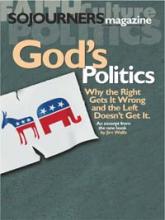In our current idiom, faith has become something rather foolhardy, something risky and uncertain. We might say, "that requires a lot of faith"-meaning a sensible person would do something else. This month's readings challenge us to reexamine our understanding of faith and what it means in our lives. The scripture for weeks three and four contain the element of risk we often associate with faith. Abraham is called to leave the security of his homeland for an unknown future, and the Israelites and Paul experience the sufferings that can beset us when we answer God's call in our lives.
But readings for the first two weeks counterbalance this. Peter's letter talks of the importance of focusing on the fact that Jesus' power and glory will be revealed in our world. The temptation narrative in Matthew reminds us that true faith in God can give us insight into the truth-far beyond the superficial untruths that temptations offer us. Following God can feel risky, but underneath everything there is a certainty. Faith involves allowing the details of our lives (such as where we live and what we do) to be uncertain while knowing that the fundamentals are unshakeable. The difference between a life of faith and a life of unbelief is that a life of unbelief contains only the details with nothing to underpin them; a life of faith has solid foundations, which make the details much less important. Paula Gooder is a lecturer at the Queen's Foundation, Birmingham, England, and a freelance biblical lecturer and writer.
FEBRUARY 6
Focusing on the Light
Exodus 24:12-18; Psalm 99; 2 Peter 1:16-21; Matthew 17:1-9>
Read the Full Article
